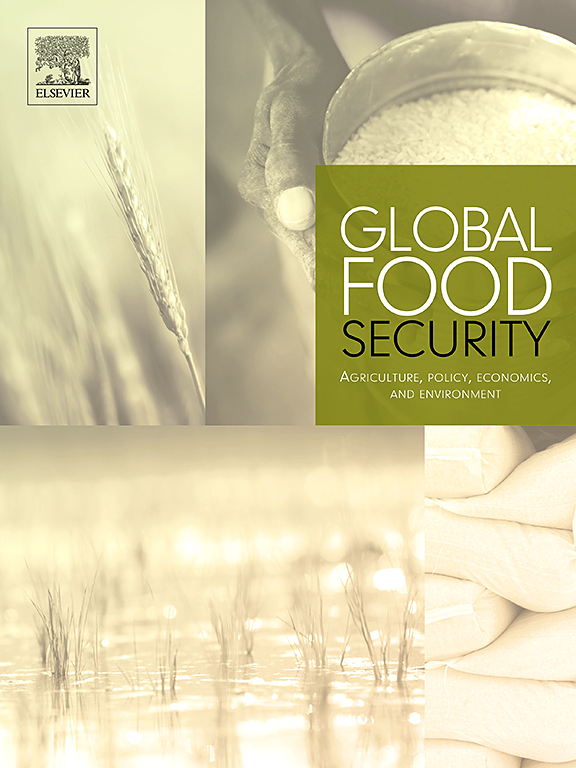食物系统游戏的可持续发展转型-回顾
IF 9.6
1区 经济学
Q1 FOOD SCIENCE & TECHNOLOGY
Global Food Security-Agriculture Policy Economics and Environment
Pub Date : 2025-06-01
DOI:10.1016/j.gfs.2025.100864
引用次数: 0
摘要
互动严肃游戏可以帮助促进许多利益相关者认为必要的可持续粮食系统转型,因为它们有可能捕捉系统复杂性,激发对话,并在不同情况下探索策略。然而,这些游戏在多大程度上捕获了多种食物系统组件还有待确定。因此,我们对游戏中多种食物系统组件覆盖的文献进行了系统回顾,并评估了它们在指导可持续食物系统转型方面的潜在用途。我们发现有19款游戏至少涵盖了食物系统的两个组成部分,其中8款涉及可持续食物系统的结果。其中两款游戏具有覆盖所有食物系统组件的潜力,并允许对经济、社会和环境结果进行反思。其他游戏虽然没有涵盖所有元素,但却在元素之间建立了强大的联系,或者将结果与多个可持续性维度联系起来。在食物系统转变方面,大多数游戏都显示出改变食物系统参与者小众群体心态的潜力。然而,只有两种方法可以与不同的利益相关者群体一起使用,其中一种方法还可以应用于政治领域。未来的研究应该集中在进一步捕捉游戏中的系统复杂性,以支持想象和评估各种策略的效果。通过与不同的利益相关者进行这些游戏,他们就有可能解决粮食系统转型所需的多种观点、跨学科和共同创造战略。本文章由计算机程序翻译,如有差异,请以英文原文为准。
Food system games for sustainability transformation – A review
Interactive serious games can help facilitate sustainable food system transformation that many stakeholders deem necessary, due to their potential of capturing system complexity, stimulating dialogue, and exploring strategies in different scenarios. However, to what extent such games capture multiple food system components has yet to be established. We therefore conducted a systematic review of the literature on multiple food system component coverage in games and to assess their potential use in guiding sustainable food system transformation. We found 19 games that covered at least two food system components, of which eight addressed sustainable food system outcomes. Two of these games had the potential of covering rather all food system components and allowing reflection on economic, societal and environmental outcomes. Other games did not cover all components but did make either strong connections between the ones that were included or linked outcomes to multiple sustainability dimensions. For use in food system transformation, most games showed potential in transforming mindsets of a niche group of food system actors. However, only two could be played with a diverse group of stakeholders, of which one could additionally be applied in the political landscape. Future research should focus on further capturing system complexity within games to support imagining and evaluating effects of various strategies. By playing these games with different stakeholders, they could then have the potential to address the plurality of perspectives, cross disciplines and co-create strategies needed for food system transformation.
求助全文
通过发布文献求助,成功后即可免费获取论文全文。
去求助
来源期刊

Global Food Security-Agriculture Policy Economics and Environment
FOOD SCIENCE & TECHNOLOGY-
CiteScore
20.90
自引率
3.40%
发文量
69
期刊介绍:
Global Food Security plays a vital role in addressing food security challenges from local to global levels. To secure food systems, it emphasizes multifaceted actions considering technological, biophysical, institutional, economic, social, and political factors. The goal is to foster food systems that meet nutritional needs, preserve the environment, support livelihoods, tackle climate change, and diminish inequalities. This journal serves as a platform for researchers, policymakers, and practitioners to access and engage with recent, diverse research and perspectives on achieving sustainable food security globally. It aspires to be an internationally recognized resource presenting cutting-edge insights in an accessible manner to a broad audience.
 求助内容:
求助内容: 应助结果提醒方式:
应助结果提醒方式:


